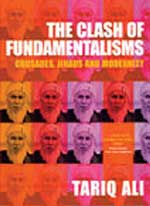
| HOME |
| NERVE |
| REVIEWS |
| ARCHIVE |
| EVENTS |
| LINKS |
| ABOUT US |
| CONTRIBUTORS |
| BACK ISSUES |
| CONTACT US |
Clash of Fundamentalisms
Tariq Ali (Verso, 2003)
Reviewed by Alan Thomson
 This
book, an intriguing mix of autobiography, history and polemic, traces
the unhappy history of Western involvement in the Muslim world, with the
first chapter taken up with Ali’s reminiscences of his Pakistani
and English childhood and teenage years.
This
book, an intriguing mix of autobiography, history and polemic, traces
the unhappy history of Western involvement in the Muslim world, with the
first chapter taken up with Ali’s reminiscences of his Pakistani
and English childhood and teenage years.
The rest of these writings are interspersed with these personal recollections as well as offering an excellent muckraking journalistic interpretation of the colonial histories, especially that of the US. With all the nonsense that gets regularly parroted in the media about the US government having a strong isolationist streak in it’s core, unchanging through various administrations, it is welcome that Ali nails this particular myth by pointing out that the USA has been elbow deep in bloody imperialism since the founding fathers and indeed, the now infamous Monroe Doctrine served as inspiration for the NSDAP ideologues in 1920’s Germany who developed Monroe’s insistence on US hegemony in Latin America into the notion of Lebensraum.
A central theme, which can be guessed at by the title, is that of all the most dangerous ‘fundamentalisms’ in the world today, the USA brand of neo-conservative economics, Christian fundamentalism and the aggressive foreign policy required to service these crackpot theologies stands out as the greatest danger of our times, and not the relatively disorganised Al Qaeda.
Indeed, as Ali points out, it is the U.S itself which has been a consistent catalyst in the creation of Islamic fundamentalism, from it’s craven support for the mind bogglingly corrupt medievalism of the House of Saud, to the terrible, late, Suharto of Indonesia (a ruler, lest we forget, who in terms of the body count he engineered, made Saddam look like a small time criminal), whose bloodthirsty kleptocracy the USA supported to the bitter end, and of course, Osama Bin Laden himself and the rest of the religious fanatics sponsored in the war against the USSR puppet government in Afghanistan by Washington.
Overall, this is a masterful and most timely account of the history of Western interventionism in the Muslim world and of the duplicity and mendacity of many of the leaders in the countries under the thrall of Pax Americana, both Christian and Muslim. Tariq Ali repeatedly expresses in the book his wish for an Islamic equivalent of the enlightenment, and for a new generation of socialist leaders for the Middle and far eastern nations, who would stand up to U.S omnipotence. For Ali is as quick to blame what he sees as the failures of the Islamic hemisphere on the current bleak state of affairs as he is to blame the American war machine. Ali is notoriously a socialist of the ‘bottom-up’ revolution tendency and believes that if nations remain mired in reactionary religious politics and genuflection to the economies of the most powerful countries, no change for the better will ever be forthcoming. Despite recent world events seemingly pushing his wish list even further over the political horizon, it is difficult to disagree with this analysis. Then again, fighting for socialist values, or even Western style liberties in Saudi Arabia, Indonesia, Egypt, Syria et al can prove to be terminally bad for your health. How many of us in their position would have the sort of bloody-minded courage to do the same?